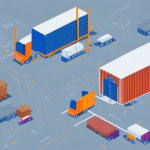A Comprehensive Guide to Understanding 3PL, 4PL, and 5PL
In the world of logistics and supply chain management, terms like 3PL, 4PL, and 5PL are often used to describe different levels of outsourcing and service. However, many people are not familiar with these terms or have trouble distinguishing between them. This guide provides a comprehensive understanding of 3PL, 4PL, and 5PL, including how they work, their benefits and differences, and real-world examples of successful implementations. Read on to learn all about these essential concepts in logistics and supply chain management.
What is 3PL and How Does it Work?
A third-party logistics provider, or 3PL, is a company that offers logistics services to businesses in need of supply chain support. These services can include:
- Transportation
- Warehousing
- Inventory Management
- Order Fulfillment
- Freight Forwarding
Essentially, 3PL providers help businesses outsource their logistics needs to experts who can manage these operations more efficiently and cost-effectively.
How Does 3PL Work? A business partners with a 3PL provider to handle their logistics operations. The 3PL provider collaborates with the business to determine their specific needs and create a tailored logistics plan. From there, the 3PL provider manages all logistics-related operations, including:
- Managing inventory and warehousing
- Transportation and delivery
- Handling returns and exchanges
- Providing real-time tracking and reporting
One of the key benefits of using a 3PL provider is the ability to scale operations up or down as needed. For example, if a business experiences a sudden increase in demand, a 3PL provider can quickly ramp up their logistics operations to meet that demand. Conversely, if demand decreases, the 3PL provider can scale back operations accordingly, helping the business save money on logistics costs.
The Benefits of Outsourcing Logistics to a 3PL Provider
Outsourcing logistics to a 3PL provider offers numerous benefits:
- Focus on Core Competencies: Allows businesses to concentrate on their primary activities without getting bogged down in logistics management.
- Cost Savings: 3PL providers optimize supply chain operations, reducing costs through economies of scale and expertise.
- Improved Flexibility: Easily adjust logistics operations based on market demand and business needs.
- Increased Scalability: Seamlessly scale logistics operations up or down to match business growth or seasonal fluctuations.
- Access to Advanced Technology: Leverage the latest logistics technologies and best practices without additional investment.
Additionally, partnering with a 3PL provider grants access to their extensive network of carriers and warehouses, providing greater transportation options and storage facilities. This is especially beneficial for companies operating in multiple regions or countries. Moreover, 3PL providers can negotiate better rates with carriers, passing those savings on to their clients.
4PL vs 3PL: What's the Difference?
While 3PL providers offer a range of logistics services, 4PL providers take things a step further. A 4PL provider acts as a logistics consultant, managing a business's entire supply chain from start to finish. This includes not only logistics operations but also strategic planning, supplier relationship management, and overall supply chain optimization.
Key Differences Between 3PL and 4PL:
- Scope of Services: 3PL focuses on managing logistics operations, while 4PL provides a holistic approach to supply chain management.
- Control Level: With a 3PL, businesses retain significant control over logistics operations. In contrast, a 4PL provider assumes greater responsibility and control, allowing businesses to focus more on their core competencies.
- Strategic Involvement: 4PL providers engage in strategic planning and analysis, offering insights and strategies to enhance the entire supply chain.
The Evolution of Logistics: An Introduction to 4PL and 5PL
Logistics has continually evolved, giving rise to new outsourcing models like 4PL and 5PL. A fifth-party logistics provider, or 5PL, acts as a logistics integrator, coordinating multiple logistics providers to manage a business's supply chain. 5PL providers have emerged to address the increasing complexity of global supply chains, offering businesses comprehensive management of logistics operations on a global scale.
The evolution from 3PL to 4PL and 5PL reflects the growing complexity and globalization of supply chains. By partnering with these advanced logistics providers, businesses can:
- Manage complex, multi-national supply chains efficiently
- Reduce costs through integrated logistics solutions
- Improve operational efficiency and responsiveness
- Access advanced technology and data analytics
Benefits of 4PL and 5PL Providers:
- Advanced Technology: Utilize cutting-edge software and tools for supply chain optimization.
- Data Analytics: Leverage data to reduce waste and improve decision-making.
- Market Insights: Gain valuable insights into market trends and consumer behavior.
- Streamlined Communication: Enhance collaboration between multiple logistics providers.
How a 4PL Provider Can Help You Optimize Your Supply Chain
If you're looking to optimize your supply chain operations, working with a 4PL provider can be highly effective. By adopting a comprehensive approach to supply chain management, a 4PL provider can help you identify areas for improvement and implement solutions to streamline your operations.
Ways a 4PL Provider Can Optimize Your Supply Chain:
- Providing strategic planning and analysis
- Managing logistics operations
- Negotiating with suppliers
- Implementing technology solutions to improve efficiency and reduce costs
Ultimately, partnering with a 4PL provider enables businesses to elevate their supply chain performance and achieve greater success.
Understanding the Role of a Lead Logistics Provider (LLP)
A Lead Logistics Provider, or LLP, is a specialized type of 4PL provider that manages end-to-end supply chain operations. An LLP takes on a leadership role, overseeing all logistics activities and coordinating with other logistics providers to ensure smooth and efficient operations.
Key Services Provided by an LLP:
- Strategic planning and network design
- Supply chain optimization
- Supplier management
- Risk management
- Compliance and regulatory oversight
By working with an LLP, businesses can ensure their supply chain operations are running efficiently, even in complex or global environments.
The Advantages of Partnering with a 5PL Provider for Your Logistics Needs
If you're managing complex global supply chains, partnering with a 5PL provider can be highly effective. 5PL providers possess the expertise and resources to handle logistics operations on a global scale, including:
- Coordinating multiple logistics providers
- Navigating complex customs and regulations
- Optimizing shipping and delivery operations
- Implementing advanced technological solutions
Benefits of Working with a 5PL Provider:
- Cost Reduction
- Enhanced Efficiency
- Improved Supply Chain Visibility
- Access to Global Expertise
By leveraging the latest technology and industry best practices, a 5PL provider can help your business stay ahead of the curve and achieve new levels of success in your supply chain operations.
Choosing Between 3PL, 4PL, and 5PL: Factors to Consider
Choosing the right outsourcing model—whether 3PL, 4PL, or 5PL—depends on your business's specific needs. Consider the following factors when making your decision:
- Business Goals: Align your logistics strategy with your overall business objectives.
- Supply Chain Complexity: Assess the complexity and scale of your supply chain operations.
- Budget: Consider the costs associated with each outsourcing model and the potential return on investment.
- Control Level: Determine how much control you want to retain over your logistics operations.
- Technological Needs: Evaluate your need for advanced technologies and data analytics.
If your supply chain operations are relatively straightforward, a 3PL provider may be sufficient. However, for more complex or global supply chains, a 4PL or 5PL provider might be a better fit. The key is to work with a provider that can customize their services to meet your specific needs and help you achieve your business goals.
Case Studies: Real-World Examples of Successful Implementations of Various PLs
Several businesses have successfully implemented various PL models, resulting in improved efficiencies and cost savings. Here are some examples:
- Global Shipping Company: Partnered with a 5PL provider to reduce costs and streamline operations across multiple continents.
- Consumer Goods Company: Collaborated with a 4PL provider to optimize supply chain operations and improve delivery times, enhancing customer satisfaction.
- Healthcare Company: Worked with a 3PL provider to outsource logistics needs, allowing the company to focus on core competencies and patient care.
These case studies demonstrate the tangible benefits of outsourcing logistics and supply chain management to various PL providers, offering valuable insights into how businesses can effectively navigate these outsourcing models.
Future Trends in Logistics and the Implications for PL Providers
The logistics industry is constantly evolving, with new technologies like artificial intelligence (AI) and robotics set to have a major impact in the coming years. PL providers must stay ahead of these trends to remain competitive. Key trends to watch include:
- Automation and Robotics: Increasing use of automated systems to enhance efficiency and reduce human error.
- Sustainability and Ethical Sourcing: Growing focus on environmentally friendly practices and ethical sourcing to meet consumer demands.
- Globalization: Continued expansion of supply chains across borders, necessitating sophisticated management solutions.
- Blockchain Technology: Enhancing transparency and traceability in supply chains through decentralized ledgers.
By embracing these trends and integrating new technologies, PL providers can help their clients navigate the ever-changing landscape of global supply chains and achieve sustained success.
How Technology is Revolutionizing the Logistics Industry, and What it Means for PLs
Technology plays an increasingly vital role in the logistics industry, revolutionizing operations and offering new opportunities for PL providers. Key technological advancements include:
- Real-Time Data: Utilizing real-time data to optimize supply chain operations, improve decision-making, and increase transparency.
- Automation and Robotics: Streamlining operations through automated systems, reducing labor costs, and enhancing accuracy.
- Blockchain Technology: Improving supply chain transparency, traceability, and security through decentralized ledger systems.
- Artificial Intelligence (AI): Enhancing forecasting, inventory management, and strategic planning through advanced AI algorithms.
These technological advancements enable PL providers to offer more efficient, transparent, and reliable logistics solutions. Embracing these technologies is essential for PLs to stay competitive and meet the evolving demands of their clients.
Overall, understanding 3PL, 4PL, and 5PL is essential for any business looking to optimize their supply chain operations and improve efficiency. By partnering with the right PL provider, businesses can enjoy a range of benefits, from improved flexibility and efficiency to cost savings and access to the latest industry knowledge and trends. If you're looking to stay ahead of the curve in logistics and supply chain management, start exploring your options for 3PL, 4PL, and 5PL providers today.






















